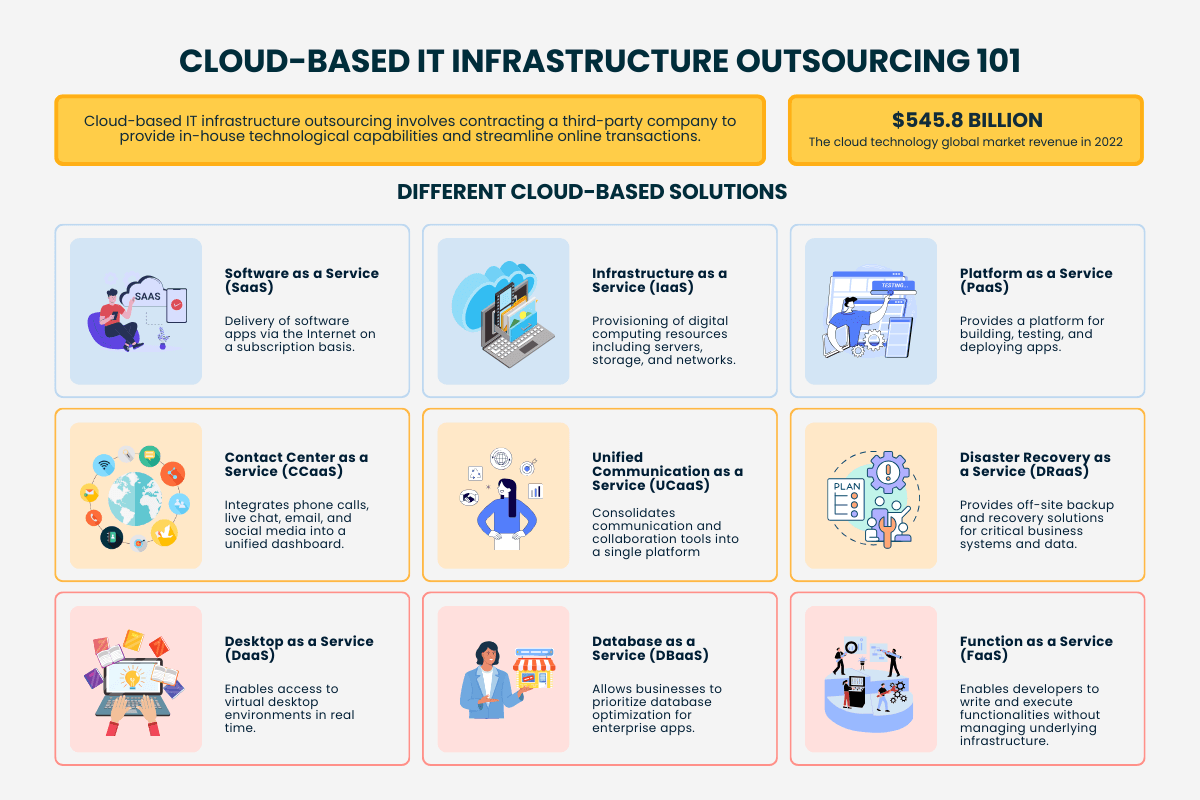IN THIS ARTICLE
Table of Contents
Picture this: Five-minute system errors can cause hour-long, digitized data to get lost, wasting time and effort. Furthermore, the resulting gap slows overall operations and delays critical problem resolutions.
In this situation, business process outsourcing (BPO) can help. Information technology (IT) support providers offer cloud computing services to ensure safe data handling and storage over the Internet. The practice also streamlines processes and reduces operating expenses.
Are you curious about how to optimize cloud-based solutions for business growth through outsourcing? Keep reading to learn more.
What Is Cloud-Based IT Infrastructure Outsourcing?

Cloud-based IT infrastructure outsourcing means contracting a third-party company to provide your in-house technological capabilities and streamline online transactions. You utilize third-party skills and cloud-based services to address the complexities of physical equipment and paperwork.
Outsourcing cloud solutions gives you access to a virtual pool of servers, storage systems, databases, and applications. You can use these platforms anytime and anywhere, as long as you have a stable internet connection. This approach also saves you from worrying about missing or corrupted data during emergencies or unexpected system downtimes.
Cloud-Based Solutions for Business Growth Through Outsourcing

In your quest to answer the question, “What is BPO?” and how cloud infrastructure outsourcing supports enterprise expansion, remember that you can acquire different types of cloud solutions.
Each platform has unique functions to meet your changing needs and requirements. Understanding such concepts helps you purchase the best system suitable for your business. Here are the cloud-based solutions for driving your business growth through outsourcing.
- Software as a service (SaaS) facilitates the delivery of software apps via the Internet on a subscription basis. Users access apps through a web browser instead of installing software. SaaS providers handle website updates, implement security measures, and conduct infrastructure management processes.
- Infrastructure as a service (IaaS) provides digital computing resources. This service model allows businesses to outsource their IT infrastructure, including servers, storage, and networks. IaaS vendors oversee infrastructure components, while users control operating systems, apps, and related data.
- Platform as a service (PaaS) includes delivering a platform for building, testing, and deploying apps. This solution features runtime environments and software development tools.
- Contact center as a service (CCaaS) integrates phone calls, live chat, email, and social media into a single dashboard. CCaaS helps seamlessly provide customer service. This cost-effective model is the best bet to attract 90% of consumers, who spend more with companies that personalize support.
- Unified communication as a service (UCaaS) consolidates multiple communication and collaboration tools into one platform. It features voice and video conferencing, instant messaging, and file-sharing tools. UCaaS improves team engagement, coordination, and productivity.
- Disaster recovery as a service (DRaaS) provides off-site backup and recovery solutions for critical business systems and confidential data. The service involves duplicating information and apps to remote data centers, ensuring quick restoration and continuity of operations during disasters.
- Desktop as a service (DaaS) enables end users to access virtual desktop environments in real time. DaaS vendors provide centralized management, flexible workflows, and remote access capabilities to immediately resolve desktop issues.
- Database as a service (DBaaS) involves overseeing, maintaining, and scaling big data platforms. DBaaS providers take over tedious tasks such as database setup, configuration, patching, and backup. This capability lets businesses prioritize database optimization for their enterprise apps.
- Function as a service (FaaS) allows client developers to write and execute functionalities. This serverless computing platform removes the need to manage the underlying infrastructure for developing and launching microservice apps.
Benefits of Outsourcing Cloud-Based IT Infrastructure

Many businesses rely on cloud-based IT infrastructure outsourcing due to various BPO advantages. From cost savings to improved performance and reliability, this practice helps boost productivity and achieve continued success.
Let us look at how cloud-based solutions drive business growth through outsourcing:
- Outsourcing reduces expenses related to physical hardware acquisition and maintenance. Cloud service vendors offer a pay-as-you-go model, charging only for the resources you use. Aside from that, BPO enables better predictability and control over IT expenses.
- Third-party cloud services offer unparalleled scalability and flexibility. Purchasing such support assists you in quickly scaling your resources based on demand. Cloud solutions provide immediate access to computing power, storage, and networking capabilities to support operations amid changing market conditions.
- Cloud solutions include artificial intelligence (AI) and automation tools that speed up repetitive tasks. These capabilities help businesses accomplish tedious processes without losing important information.
- Hiring cloud service providers lets you boost your primary business offerings. This approach lets you offload the burden of dealing with complex hardware and infrastructure components. You can also redirect your resources, time, and expertise toward your strategic initiatives.
- Cloud service providers specialize in handling IT infrastructure online. They enable you to leverage this expertise for high-quality output. Moreover, they implement cost-effective techniques to ensure enhanced service reliability and performance.
- Cloud BPO companies execute strict security measures. Such policies are necessary to safeguard infrastructure and customer data. According to IBM’s latest statistics, 45% of breaches happened in the cloud. They use advanced technologies and encryption and perform regular audits to ensure data integrity and confidentiality.
- Cloud-based solutions include built-in disaster recovery capabilities. This feature supports business growth when outsourcing. Providers have multiple data hubs in various locations. They guarantee data replication and continuity during disasters or system failures.
- Service vendors run on reliable and resilient infrastructure. They guarantee increased performance and uptime. Their technical teams have robust networking capabilities and information centers to monitor and manage cloud infrastructure 24/7, ensuring improved performance and responsiveness for business apps and services.
- Outsourced cloud-native services enhance the omnichannel customer experience. A CCaaS platform helps centralize customer engagement and monitoring. The integrated system establishes a single view of consumer inquiries across multiple channels, addressing issues faster and more effectively.
- Cloud IT outsourcing drives global expansion. Because cloud tech is accessible through an internet connection, your employees worldwide can work together seamlessly across geographical boundaries. You can expand your operations and enter new markets without worrying about efficient communication within your remote team.
- Acquiring cloud services strengthens competitiveness. As mentioned, cloud IT BPO gives you more time and resources to advance your products and services. It helps produce superior outcomes and accelerate your time-to-market. Such capacity lets you stay ahead of the competition amid the digital and dynamic business landscape.
Due to these benefits, numerous organizations have adopted and incorporated cloud computing into their operations. The growing demand for cloud technology led to $545.8 billion in global market revenue in 2022. Markets and Markets expects the industry to increase further at a compound annual growth rate (CAGR) of nearly 18% by 2027.
Tips for Guaranteed Expansion with Cloud BPO

But before reaping the advantages of cloud-based solutions, you need to know crucial ways to attain business growth through outsourcing. A business process outsourcing guide helps set the stage for guaranteed business expansion with cloud outsourcing.
Include the following practices in your to-do list for IT outsourcing particularly cloud outsourcing:
- Specify and match your business development goals to your potential cloud provider’s capabilities and service offerings.
- Perform market research and cost analysis to weigh the prospective providers that align with your resource allocations and business needs.
- Select a reliable cloud BPO provider with a good track record of delivering results and supporting enterprise growth.
- Assess the prospect’s expertise, technology infrastructure, service pricing, and security measures to ensure they fit your expansion plans.
- Carefully negotiate contract terms and conditions before signing an official service-level agreement (SLA).
- Communicate growth expectations to ensure a shared sentiment and a clear path forward.
- Assign a contact person or team to coordinate cloud services and related tasks.
- Establish open communication lines and foster a collaborative relationship with your cloud BPO partner.
- Regularly relay your evolving needs, provide feedback, and address concerns to ensure continuous improvements.
- Develop key performance indicators (KPIs) and metrics to monitor and measure the provider’s performance and output quality.
- Use the assessment data to determine areas for improvement and make informed decisions.
- Work closely with your BPO partner to establish and implement robust security measures, data privacy protocols, and compliance standards.
- Frequently evaluate and audit the security practices to ensure sensitive data protection and regulatory compliance.
- Encourage your BPO partner to share innovative ideas and industry insights to drive your business expansion.
- Conduct in-house evaluations of your cloud BPO strategies and make necessary adjustments based on the latest industry shifts and market demands.
The Bottom Line
Many organizations use cloud-based solutions as a stepping stone for continued business growth, primarily through outsourcing. Such technology allows safe online access to data and apps without worrying about overspending or system maintenance.
Because of their capability to enable real-time, remote collaboration, cloud services help expand market reach and increase competitiveness worldwide. But you must know the practical ways to maximize these benefits, such as the ones discussed above.
Are you seeking the best cloud service for your business? Let’s connect and tackle multiple options to meet your operational requirements. Our team at Unity Communications leverages cloud-native solutions to satisfy our clients’ increasing demand for seamless digital IT support.





